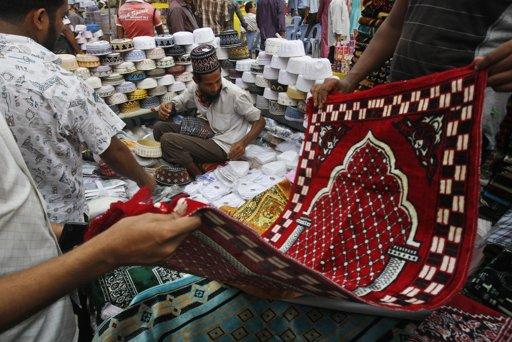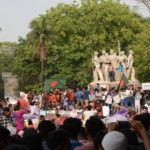If Islam is the religion of over one billion people, roughly one-sixth of humanity, Bangladesh houses a sizeable percentage of them on its soil. It ranks fourth on the list of nations with Muslim populations, preceded by Indonesia, Pakistan and India. Nearly 90% of the population here are of Islamic faith and an overwhelming majority of them are of Sunni denomination.
It’s little wonder then that the month of Ramadan – ninth in the Islamic calendar – holds a special place in the hearts of the Muslims of this country. Despite having the garb of a “moderate” Muslim nation with secularism as one of the four founding pillars of its constitution, Bangladesh has Islamic values deeply rooted in its culture. Islam influences it in a way that no other religion or institution does, and controls the way public decisions are made or unmade.
There are many who talk about a declining popularity of religious norms and practices, an idea often presented with updated records of criminal behaviour and statistics on recidivism. These figures reinforce the idea of moral decadence and growing religious dissidence in society.
However, while these issues remain debated in the contemporary theological discourse, as far as performing rites and prayers are concerned, people are no less religious now than they used to be 20-30 years ago. Evidently, there are a greater number of houses of worship today – mosques, churches, temples, monasteries, seminaries. More people are seen queuing up at the Royal Embassy of Saudi Arabia to obtain visa for the two holiest cities for Muslims – Mecca and Medina – to perform Hajj and Umrah.
The same can be said of the holy places and shrines of other religions, too. More and more funds are being pumped into religious missions and projects for the purpose of preaching. The physical expansion of religion, at least on the face of it, is evident across the country. Going by this line of thought, one would be hard-pressed to deny the influence that religion has over our society.
More and more funds are being pumped into religious missions and projects for the purpose of preaching. The physical expansion of religion, at least on the face of it, is evident across the country.
In Bangladesh, where social customs have been to a great extent influenced by Islamic principles, Ramadan holds a special place in the hearts of people because it has a unifying effect on the people of all faiths and classes. But I will come to that point later.
With this year’s Ramadan well into its first week, it would be perhaps an opportune moment to reflect on the way the month of fasting is viewed and observed in the world’s fourth most populous Muslim nation and, more importantly, the way it impacts people’s lives here.
What makes Ramadan so special? Let’s proceed point by point for a better understanding of the impacts of this month in our life.
Iftar
There is a sense of universal brotherhood embedded in the rites and rituals of iftar, and in the way hospitality is extended towards the unfed. People of different faiths are treated equally in a spirit of bonhomie. Iftar, in Bangladesh, is as much a religious occasion as it is a social one.
At my current workstation, we have people of all kinds of faith and people of no faith. Split in separate groups formed section-wise, we have our iftar meals as soon as the muezzin’s call to Maghrib prayer is heard. A similar situation is seen in many other offices, too.
Out on the streets, you see people who have no past acquaintance of any sort but still exchange mutual invitations for iftar, prepared with greasy food items bought from makeshift shops and served either on plates or spread newspaper sheets. The only thing they and Muslims elsewhere in the world have in common is the dates, imported mostly from the Middle East, and usually eaten in threes in emulation of the Prophet Mohammad (peace be upon him). Besides date, food prepared for breaking fast is mostly indigenous.
Restaurants and food outlets also prepare special meals and desserts for iftar, and even for sehri of late, as a growing number of people now prefer eating from roadside takeaways for a change. Political parties, in a rather perfunctory display of fraternity, host iftar parties in which they invite both their allies and adversaries. These parties, however, mean little to the general public who view them as half-hearted attempts to bring political rivals on a single podium and have them snapped together.
What would amaze a foreigner, however, is the making of “exotic” dishes that typify a Bengali fast-breaking celebration. A trip to the Chawk Bazaar or Kaptan Bazaar in the old part of the capital will confirm that. The two places are noted for serving savoury iftar delicacies, including Boro Baper Polai Khai (a well-known Dhakaite chicken cocktail, literally meaning “what sons of well-off fathers eat”), lip-smacking kebabs and caramelised golden jilapis, to name a few. They are put on display in open-air food stalls and the numerous shops lined side by side in long rows.
Sehri
Sehri makes the start of something that iftar ends – a daylong abstinence from food, drinks, and sexual intercourse. It is the last meal before a Muslim gets to start his or her fast. What typifies a Bengali-style sehri? Is there anything distinctive about this “optional” observance of Ramadan?
Generally speaking, iftar or fasting is nothing exclusive to Islam, but sehri is. All major religions like Christianity, Buddhism, Hinduism, Judaism and Sikhism prescribe fasting and iftar (to mean ending the fast) in one form or another. Even believers in little-known Jainism, Taoism and Bahá’í faiths observe fast for a certain period of time and break it at the day’s end – either before sunset, during or after.
But none of these religions have sehri as such. In Islam, it is not “compulsory” for a Muslim to have food in the early hours, but it is highly advisable that one does. In the religious jargon, sehri was termed as a Sunnah – something the prophet (pbuh) set a precedent for himself doing. Muslims eat and perform niyaat (i.e. make their intention for fasting known to Allah) before the call to Fadr prayer is announced. The fast commences about five minutes before that call. While Bangladeshi Muslims observe this rite quite religiously, there is one particular thing that deserves mention.
In many neighbourhoods in Dhaka, especially in the older part of it, there are some people who decidedly wake a little before others do. They take it upon themselves to wake early so they can wake everyone else up for sehri. They go out on the streets, walking in groups and banging their fists or sticks on every gateway as they march forward, and spread the wakeup call. The message is loud and clear for everyone to hear: Get up, get up, and get up. Your time to sleep is up, now it’s time for sehri!
These groups are usually formed by members of local youth clubs, though anyone can volunteer regardless of age. Each group consists of 10-15 volunteers, armed with double-sided drums slung over their necks, or flutes, whistles, tinplates or anything capable of making loud sounds. In the quietude of night they make their rounds of the alleys, lanes and street corners through the sleepy neighbourhoods.
They take it upon themselves to wake early so they can wake everyone else up for sehri. They go out on the streets, walking in groups and banging their fists or sticks on every gateway as they march forward, and spread the wakeup call. The message is loud and clear for everyone to hear: Get up, get up, and get up.
In India, and Bangladesh too, there are certain places where sirens and trumpets are blown to signal the approaching time of an iftar. But these techniques are more effective before sehri. In many railway stations, mosques, fire service offices and mills in Bangladesh, sirens are blown with the perceived start of the sehri time. It happens usually one hour before the call to Fadr prayer. In some places, especially in the countryside, school bells are rung.
These techniques, however, are not greeted as heartily in uptown neighbourhoods where people prefer discretion and tranquillity. They are more inclined to do things on their own. Night guards can blow whistles alright, but anything more than that is discouraged. The most common type of wakeup call is that which comes from the mosques by the muezzin or the imam or a third person. They, using microphones, exhort people to prepare for sehri, conduct their niyaat and stop eating when the time is up. Whilst saying all these, they, intermittently, recite verses of the holy Quran and sing devotional songs.
Changes during Ramadan
The holy month of Ramadan has profound implications some of which I would try to reflect on below. Ramadan heralds both physical and spiritual changes in life, ranging from daily schedules to patterns of people’s conduct. Its influence is profound and all-inclusive.
To begin with, major government and non-government schedules in Bangladesh are reorganised in light of the spirit of the month. Most schools and colleges, private and public, are closed in the first week of the month. They reopen only after Eid-ul-Fitr.
Some institutions may push back their closing time to the second week, given the challenges of meeting exam deadlines. Universities, on the other hand, have no option but to go for a shorter vacation but they will invariably have their timetables rescheduled in order to conform to the changing needs of the time.
Office-goers have shorter hours to work. Transaction hours in banks and non-bank financial institutions are cut short. With these changes, the society also learns to adapt itself to a few changes of its own. Fasting is held in such high esteem in the country that eating, drinking and smoking, between dawn and sunset – in public view – are done without.
One may risk being chastised for doing these things with a faster looking on. This is not to mean that Ramadan, a religious occasion for the majority of the people, imposes restrictive measures on the religious minorities. It is just that believers in other faiths are expected to return the same gesture of courtesy and openheartedness that they are shown during their respective occasions.
That said, the kind of interfaith harmony seen in Bangladesh can be an example for countries seized with ethnic and religious tension. Especially, during these thirty or so days, Muslims are nudged into reaching out to their non-Muslim counterparts and driving home the message of love and unity – which is at the core of the Islamic faith.
The spirit of Ramadan
It is not without a reason that fasting is viewed as the most important of all physical ibadahs (worships) in Islam. Fasting is viewed as so not because of its being a strenuous physical exercise, but because of what comes along with it. For one, you cannot fake it. You cannot, and do not, pretend to be fasting as you have only yourself to be accountable to. Either you exercise restraint or don’t – there is no middle ground. With fasting comes an array of responsibilities that take it to a whole new level – which are primarily the reasons it is held in such high regard.
Fasting teaches you to strive for moral and spiritual attainment. Through the physical exercise of restraint, your efforts should be directed to purging yourself of envy, falsehood, malevolence, pettiness, selfishness, greed, evil-speaking, and all that drives one off the path of enlightenment.
Fasting teaches honesty, tolerance, moderation, humility, truthfulness, discipline, punctuality, and all that makes a man a balanced individual. Jakat (obligatory almsgiving) and Sadqa (charitable giving) – traditionally given during Ramadan – underline the importance of distribution of wealth in creating an equal society. The prophet (pbuh) highly recommended helping those in need in this month, which only reinforces the idea of charity in general.
Fasting teaches you to strive for moral and spiritual attainment. Through the physical exercise of restraint, your efforts should be directed to purging yourself of envy, falsehood, malevolence, pettiness, selfishness, greed, evil-speaking, and all that drives one off the path of enlightenment.
Taraweeh (night-time prayer) and Itakaf (reclusion) are of crucial importance, too, and both have important messages to deliver. None of the rituals are compulsory, contrary to popular belief, but given the persistence of the prophet (pbuh) on performing the post-Isha special prayers and the self-imposed retreat from daily life through Itakaf – it is understandable that they have high spiritual values.
Lastly, it bears repeating that if you are a Muslim and want to reap the full benefits of Ramadan, the last thing you would want is a perfunctory association with its rituals because Ramadan is not just a bunch of do’s and don’ts. It’s so much more. And it demands full awareness of its values and messages and people who are fasting are expected to keep its spirit alive all year long.











